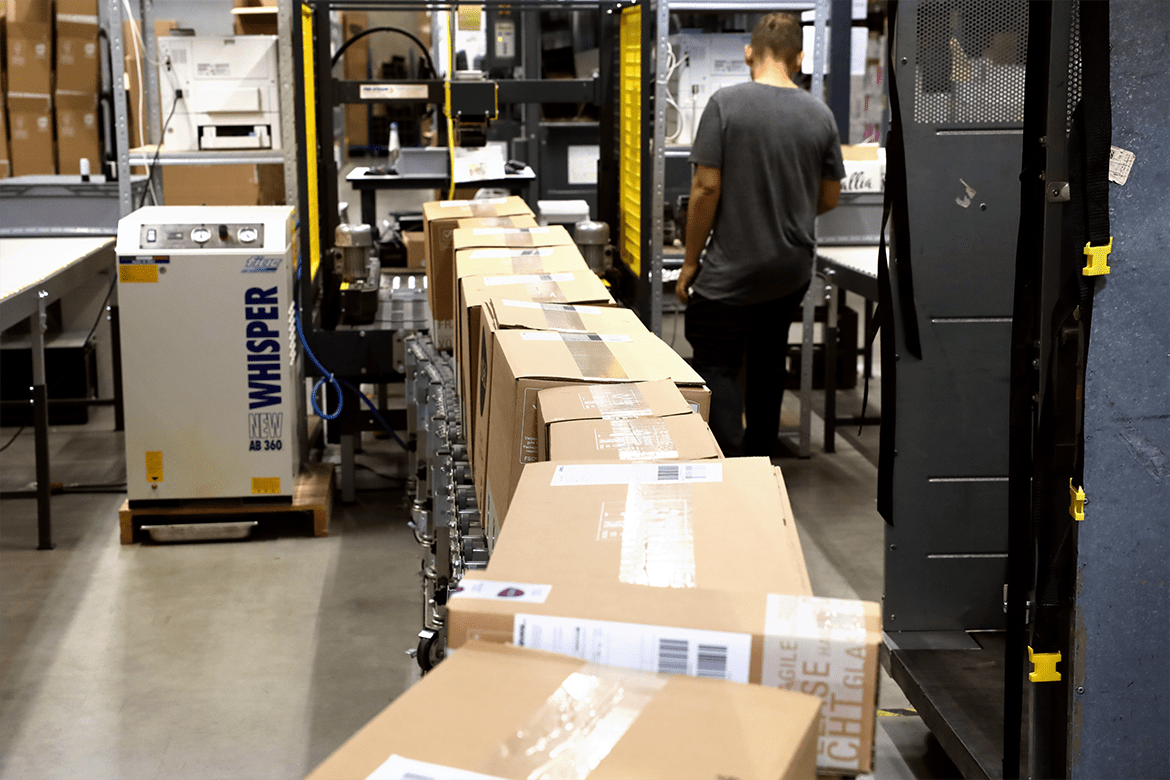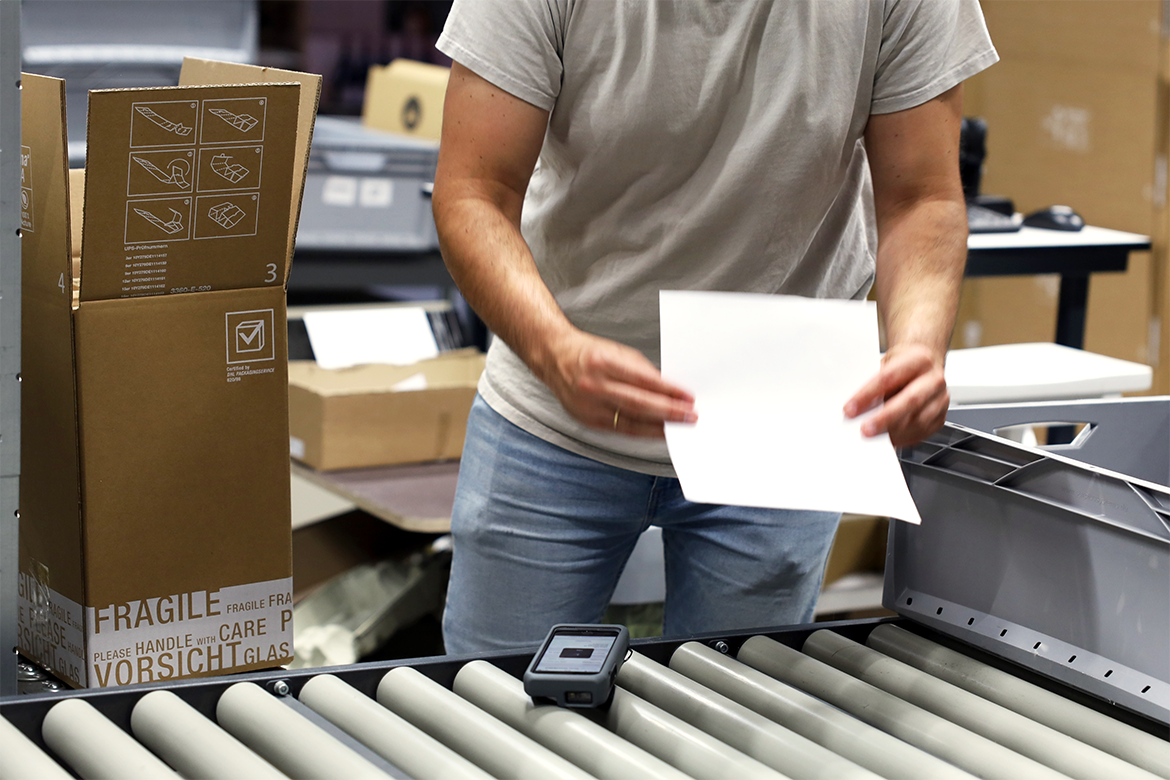Fulfillment vs. in-house shipping – Which strategy works best?
Written by
Editorial TeamPublished on

A particular challenge for online retailers: fast and cost-effective shipping
In online retailing, a large number of items have to be stored, picked, packed and shipped to customers as quickly as possible. Added to this are challenges such as fluctuations in demand, changes in product range and the often time-consuming handling of returns. Without a doubt, fast and reliable shipping of goods is one of the most important criteria for success in e-commerce. But what is the most efficient way to ensure this? For you as an online retailer, there are two basic options: carry out all shipping processes yourself or hire an external fulfillment service provider.
Depending on your requirements, business model and product assortment, the advantages and disadvantages of the two options vary. In this article, logistics expert Pickware therefore gives you a comprehensive overview of the two approaches.
Outsourcing to a fulfillment service provider
Probably the quickest and, in the short term, most cost-effective way to have your own online store is to outsource the goods management and shipping process to external fulfillment service providers. They offer handling a wide range of processes around warehouse management, picking, inventory, returns management, and shipping for you. In practice, you can choose which warehouse processes and to what extent you want to outsource them.

For example, goods can be produced or purchased in-house and stored with the service provider for the shipping process. With dropshipping, on the other hand, you are handing all of your orders over to either one or multiple service providers. They produce or purchase the goods and take care of subsequent deliveries and all the services involved in shipping. As an online retailer, you benefit from a very low commitment of time and financial resources since you do not have to pay for the goods in advance. Another benefit is that some of these providers often take over additional processes such as customer support or returns processing.
Advantages of fulfillment
- Low investment costs and low start-up capital
- No fixed costs for storage and personnel
- Variable costs depending on business volume
- High adaptability to temporary order peaks
- Good scalability
However beneficial, the savings in effort are offset by only little control over the shipping process and the quality of the shipped goods. Chances of losing an important customer touch point are high, if even support is outsourced. From a financial point of view, parts of your profit directly contribute to the payment of the provider. So let`s take a look at the compiled list of disadvantages of external fulfillment:
Disadvantages of fulfillment
- Strong dependence on the service provider
- Little influence on packing and delivery times
- No direct access to the product
- Low flexibility
- Fewer personalization options in packaging and customer experience
- More difficult control over processes and quality
- Standard processes without modification or prioritization
- Lower margins
Own warehousing and in-house shipping
At first, it may sound tempting to save time and money by working with a fulfillment service provider. However, for most online retailers, in-house warehousing and order picking is the more sensible alternative in the long term – given that certain prerequisites are met.

One of these prerequisites is the use of an integrated ERP system, such as Pickware ERP, in conjunction with a barcode-based warehouse management to optimize warehouse processes. This way, you always have an overview of your stocks in your own warehouse. You can reorder goods in time at the push of a button or simply determine turnover frequencies. With this setup, you keep the effort as low as possible and still have full control over your processes, can resolve delivery problems yourself and individually design the dispatch of goods. For example, you can prioritize customers, freely select the shipping service provider, or use specially designed packaging – a great marketing asset, if you want to stand out from your competitors and give your orders a personal note. In addition, shipping orders yourself saves on payment and communication costs with the external service provider.
Advantages of in-house shipping
- Immediate access to items
- Good overview of stock levels
- Own dedicated and involved staff- Better flow of information
- Possibility of individual package inserts e.g. for promotions or for regular customers
- Better possibilities to prioritize incoming and outgoing goods
- Greater control over processes
- Better adaptation of the warehouse to product-specific storage conditions
- Greater proximity to customers
However great these advantages might be, you need to be mindful that carrying out fulfillment itself requires a high level of resource input right from the start of the business. A sufficiently large storage area is needed, additional employees might be required for order picking, and all the goods on offer must already be paid for in order to ensure high availability. The time required to solve problems and process returns also should not be underestimated. This is where a barcode-supported software solution for warehouse management and picking can help. With Pickware WMS, for example, you carry out all processes in the warehouse digitally with mobile barcode scanners, which enable the automation of many process steps such as the creation of shipping labels and greatly minimize error rates.

Disadvantages of in-house shipping
- Risk of idle capacity costs
- High overhead and investment costs
- Lower adaptability to temporary order peaks
- Potentially additional personnel costs
Conclusion
Ultimately, you should always take into account all the requirements and framework conditions and make a decision based on your individual situation, determining whether external fulfillment is an advantageous model for your own online store. For the right choice of your strategy, the factors of cost, quality and control should always be considered. If you run your online store only temporarily, or sell only a few products in small quantities, outsourcing to a fulfillment service provider may be a suitable alternative to setting up your own warehouse and shipping processes. However, for most online retailers, in-house warehousing in combination with a solution like Pickware is the more advantageous alternative in the long run, because in the end, customer and product proximity, process optimization, profit maximization and control over core processes are crucial factors for the long-term success of your e-commerce business.
You can meet the author during the E-commerce Berlin Expo 2023:


